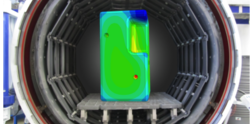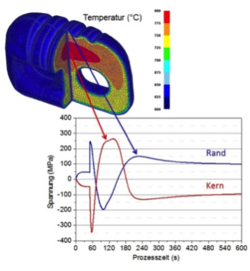A special focus of research in production processes at MCL is on the simulation of heat treatment of steels. In the course of that process, a number of physical phenomena (e.g., heat transfer, heat conduction, viscoplasticity, phase transformations, transformation-induced plasticity) occur simultaneously, each one interacting with each other. These complex mechanisms and their influences on the local material properties and residual stresses – which will finally be inhomogeneously distributed across the workpiece – are described by strongly nonlinear, coupled constitutive laws and can hardly be understood and controlled without the aid of numerical simulation. For the numerical simulation of heat treatment processes, MCL pursues an approach strongly focused on the basic principles of physics of materials, but still oriented towards materials engineering applications; accordingly, many material models and constitutive laws advancing the state of the art have been developed and implemented.
From all heat treatment processes, inductive heat treatment poses special challenges for simulation, process design and control due to the additional electro-magnetic coupling. For this reason, MCL is currently focusing on such simulations, aiming at model-based process control for robust attainment of the desired target properties.
Besides conventional heat treatment aggregates, also a novel induction heat treatment test rig is available at MCL for validation and transfer of research results to industrial processes.




















